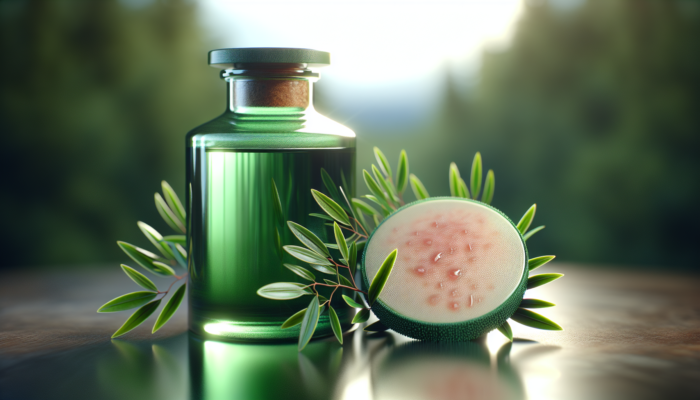Discover the Best Natural Herbs for Effective Skin Inflammation Relief
When faced with skin inflammation, nature offers a multitude of remedies that can provide soothing relief. A diverse selection of herbs for reducing skin inflammation specifically addresses issues such as redness, swelling, and irritation. Each herb possesses unique properties, making it essential to understand their individual benefits and learn how to integrate them into your skincare routine for the most effective results.
Utilizing the Healing Benefits of Aloe Vera for Skin Irritation Relief

Aloe vera, often hailed as a miracle plant, is renowned for its remarkable soothing and healing properties. The thick gel obtained from its leaves is packed with essential vitamins, minerals, and amino acids that offer exceptional benefits for maintaining healthy skin. Its potent anti-inflammatory features make it an ideal choice for calming irritated skin, particularly for those suffering from sunburn, minor cuts, or rashes.
When applied topically to the affected areas, aloe vera provides a refreshing cooling sensation that delivers immediate relief from discomfort. Moreover, its high moisture content significantly boosts skin hydration, accelerating the healing process. Studies have shown that regular use of aloe vera can lead to substantial improvements in various skin conditions, reducing inflammation and redness, while enhancing overall skin texture.
To fully harness the benefits of aloe vera, consider using freshly extracted gel from the plant or selecting high-quality gel products. By integrating this herb into your skincare routine, you can transform inflamed skin into a calm and revitalized complexion.
Chamomile: A Gentle and Effective Remedy for Sensitive Skin
Chamomile, a beloved herb in both culinary and medicinal contexts, is highly regarded for its exceptional calming effects, making it an essential addition to skincare, particularly for sensitive skin types. Known for its anti-inflammatory and antioxidant properties, chamomile effectively alleviates symptoms associated with eczema, dermatitis, and general skin irritation.
The active compounds in chamomile, including chamazulene and bisabolol, significantly contribute to its soothing effects. These components work synergistically to reduce redness and swelling, leading to a more balanced complexion. Chamomile can be utilized in various forms, such as teas, essential oils, and topical creams.
For a simple DIY remedy, consider creating chamomile-infused oil by steeping dried chamomile flowers in a carrier oil. This infusion can be gently applied to irritated skin, providing deep hydration and establishing a protective barrier against further irritation. The gentle nature of chamomile makes it suitable for all skin types, even the most sensitive.
Turmeric: Unleashing Powerful Anti-Inflammatory Benefits for Skincare
Turmeric, recognized for its vibrant yellow hue, serves as not only a culinary spice but also a potent source of anti-inflammatory benefits. The active compound, curcumin, is highly regarded for its ability to combat inflammation and encourage healing. When applied topically, turmeric can significantly reduce redness, soothe irritation, and even help treat acne.
Incorporating turmeric into your skincare routine can be as easy as preparing a facial mask. A mixture of turmeric powder, honey, and yogurt creates an effective mask that alleviates inflammation while brightening the skin. Regular application can lead to noticeable improvements in skin texture and overall tone.
However, caution is warranted when using turmeric, as it may temporarily stain the skin. Always conduct a patch test before using turmeric-infused products to ensure they are appropriate for your skin type.
Tea Tree Oil: A Powerful Solution for Skin Infections

Tea Tree Oil has gained immense popularity in the natural skincare community, primarily due to its robust antibacterial and antifungal properties. This remarkable oil, derived from the leaves of the Melaleuca alternifolia tree, has a long-standing history of use for treating various skin ailments, including acne and fungal infections.
The effectiveness of Tea Tree Oil in reducing skin inflammation arises from its ability to combat the bacteria responsible for breakouts and irritation. When applied topically, it penetrates deeply into the skin, providing a purifying effect that helps to unclog pores and diminish redness.
For safe application, always dilute Tea Tree Oil with a carrier oil such as coconut or jojoba oil to prevent potential irritation. By incorporating this herb into your skincare regimen, you can achieve clearer, calmer skin, making it especially beneficial for those with oily or acne-prone skin.
Effective Techniques for Applying Herbs to Reduce Skin Inflammations
Leveraging these powerful herbs to alleviate skin inflammation is essential for maximizing their effectiveness. Below, we present practical tips on how to seamlessly incorporate these herbs into your skincare routine, ensuring you achieve the best results without overwhelming your skin.
DIY Skincare Masks: Easy Recipes for Home Use
Creating your own skincare masks at home can be a fun and rewarding experience, especially when incorporating herbs known for their anti-inflammatory properties. A simple yet effective mask can be crafted using aloe vera, chamomile, and turmeric.
To prepare this mask, combine two tablespoons of aloe vera gel with one tablespoon of cooled chamomile tea and a pinch of turmeric powder. Blend the ingredients until smooth and apply to clean skin, allowing it to remain on for 15-20 minutes before rinsing with lukewarm water. This mask not only alleviates inflammation but also hydrates and brightens the skin.
Experimenting with different combinations of these herbs can lead to unique formulations tailored to your skin’s specific needs. Always perform a patch test when trying new ingredients to avoid adverse reactions.
Seamlessly Incorporating Herbs into Your Daily Skincare Routine

Integrating these herbs to reduce skin inflammation into your daily skincare routine can be achieved through various methods. For instance, utilizing aloe vera gel as a moisturizer not only provides hydration but also calms irritated skin. Additionally, a chamomile-infused toner can refresh and soothe the skin throughout the day.
Moreover, consider adding a few drops of Tea Tree Oil to your daily moisturizer or serum to harness its antibacterial properties. This incorporation creates a protective barrier against skin irritations, helping maintain clear and healthy skin.
Consistency is paramount in skincare, so prioritize integrating these natural remedies into your routine to experience long-lasting benefits.
Enhancing Herbal Treatments by Combining with Other Natural Ingredients
Combining herbs to reduce skin inflammation with other natural ingredients can significantly amplify their effectiveness. For example, blending turmeric with honey creates a powerful mask that not only alleviates inflammation but also provides antibacterial benefits. Honey’s natural humectant properties assist in retaining skin hydration, making it an excellent companion for turmeric.
Furthermore, pairing aloe vera with essential oils like lavender or frankincense can enhance its soothing properties, resulting in a calming lotion perfect for sensitive skin. The versatility of these herbs allows for endless combinations, enabling you to customize treatments specifically for your skin type and concerns.
When experimenting with combinations, consider your skin’s unique needs and preferences, as different ingredients may yield varying reactions based on individual skin types.
Safety Measures and Potential Side Effects of Using Herbal Remedies
While herbs offer remarkable benefits for alleviating skin inflammation, it is crucial to use them with care. Some individuals may experience allergic reactions or irritation, particularly with potent oils like Tea Tree Oil or certain herbs such as turmeric.
Always conduct a patch test before applying any new product or ingredient to larger areas of skin. If you notice any signs of irritation, redness, or discomfort, discontinue use immediately. It is also wise to consult a skincare professional or dermatologist if you have underlying skin conditions or concerns before introducing new herbs into your regimen.
Being aware of your skin type and how it reacts to different ingredients will ensure a safe and effective approach to utilizing herbs to reduce skin inflammation.
Scientific Research Supporting the Effectiveness of Herbs for Skin Inflammation Relief
As interest in natural remedies rises, research into the efficacy of herbs to reduce skin inflammation has gained significant traction. Numerous studies highlight the benefits of these herbs, providing scientific validation for their traditional applications in skincare.
Investigating the Effectiveness of Herbs for Skin Inflammations
A variety of scientific studies have explored the effects of specific herbs on skin inflammation. For instance, research has shown that aloe vera significantly reduces skin irritation and speeds up the healing process in individuals with minor burns and abrasions. The anti-inflammatory properties of aloe vera are attributed to its ability to inhibit inflammatory mediators, providing relief from discomfort.
Additionally, studies focusing on turmeric have revealed that curcumin exhibits significant anti-inflammatory effects, making it beneficial for treating conditions such as psoriasis and eczema. This evidence supports the notion that incorporating these herbs into skincare can yield substantial benefits.
Comparing Herbal Remedies with Conventional Treatment Approaches
When contrasting herbal remedies with conventional treatments for skin inflammation, the former often presents fewer side effects and a more holistic approach. Many over-the-counter medications may lead to irritation or allergic responses, while herbs like chamomile and aloe vera offer gentle and effective alternatives.
Although conventional treatments may provide swift relief, they frequently fail to address the underlying causes of inflammation. In contrast, herbal solutions can promote long-term skin health and balance, making them a compelling option for those seeking a natural approach to skincare.
Long-Term Benefits and Sustainability of Herbal Remedies
The long-term advantages of using herbs to reduce skin inflammation extend beyond immediate relief. Many herbs are rich in antioxidant properties that help protect the skin from environmental damage, contributing to healthier skin over time.
Moreover, the sustainable nature of these herbs makes them a wise choice for eco-conscious consumers. Many of these ingredients can be cultivated at home or sourced from local suppliers, thereby reducing the carbon footprint associated with conventional skincare products.
By adopting a holistic approach to skincare, individuals can achieve radiant skin while positively impacting environmental sustainability.
Emerging Research Developments and Trends in Herbal Skincare
Current research trends indicate a growing interest in the synergy between traditional herbal remedies and modern scientific practices. Studies are increasingly examining how these herbs can be formulated into effective skincare products, leveraging their natural properties while ensuring safety and efficacy.
Furthermore, there is an increasing focus on understanding the precise mechanisms that underpin the anti-inflammatory effects of these herbs, paving the way for more targeted treatments. As the natural skincare market continues to flourish, advancements in formulations that utilize herbs to reduce skin inflammation are expected to emerge, providing consumers with innovative and effective skincare solutions.
Targeting Specific Skin Issues with Herbs for Inflammation Relief
Identifying specific herbs can effectively reduce inflammation across various skin issues. Understanding their unique properties facilitates tailored treatments, ensuring that individuals can directly address their particular skin concerns effectively.
Acne: Herbal Remedies for Clearer Skin
Acne, one of the most common skin conditions, can be effectively managed with the appropriate herbal remedies. Tea Tree Oil is particularly noteworthy for its antibacterial properties, targeting the bacteria responsible for acne formation.
Additionally, turmeric’s anti-inflammatory properties can help lessen redness and swelling associated with breakouts, promoting clearer skin. Combining these herbs in a facial wash or spot treatment can enhance acne control and prevent future flare-ups.
Regular use of herbal treatments can significantly diminish acne severity, allowing individuals to regain confidence in their skin.
Eczema: Natural Solutions for Chronic Skin Conditions
Eczema, a persistent inflammatory skin condition, often requires ongoing management to alleviate symptoms. The anti-inflammatory benefits of chamomile and aloe vera make them ideal for treating eczema flare-ups.
Chamomile, known for its calming properties, can soothe irritated skin and relieve itching associated with eczema. Meanwhile, aloe vera provides essential hydration and assists in the healing of damaged skin. Utilizing a combination of these herbs in a moisturizing cream can greatly improve the quality of life for those affected by eczema.
Incorporating these natural remedies into a daily skincare routine can help manage flare-ups and enhance overall skin health.
Psoriasis: Effective Herbal Treatments for Inflammation Relief
Psoriasis, characterized by red, scaly patches, can be particularly stubborn and difficult to manage. Certain herbs have shown promise in alleviating its symptoms. The powerful anti-inflammatory properties of turmeric can reduce the severity of psoriasis flare-ups, making it a valuable addition to any treatment regimen.
Incorporating aloe vera can also calm irritated skin and ensure adequate hydration, further enhancing overall treatment effectiveness. Formulating an herbal balm or lotion that combines these ingredients can provide substantial relief for individuals struggling with psoriasis.
With consistent and careful application, improvements in skin appearance and comfort can be anticipated for those affected by this condition.
Rosacea: Gentle Herbal Solutions for Redness Relief
Rosacea, a chronic skin condition characterized by redness and visible blood vessels, can be effectively managed with gentle herbal solutions. Chamomile is an excellent choice due to its anti-inflammatory and calming properties, which can alleviate the redness associated with rosacea.
Additionally, aloe vera delivers hydration and supports the skin’s natural barrier, making it less reactive to triggers. A soothing mask or cream that combines these two herbs can be particularly beneficial for individuals with rosacea, helping to diminish flare-ups and promote a more even complexion.
By incorporating these herbal solutions into their skincare routines, individuals can find relief from the discomfort of rosacea while enhancing their overall skin health.
Supporting Skin Health Through Lifestyle Choices and Nutrition
Beyond topical treatments, lifestyle choices and dietary habits greatly impact the management of skin inflammation. This section explores how you can support your skin from within by making mindful choices that complement the use of herbs to reduce skin inflammation.
Nutritional Strategies to Boost Skin Health
A diet rich in anti-inflammatory foods can significantly influence skin health. Incorporating foods abundant in antioxidants, such as berries, leafy greens, and fatty fish, helps to alleviate inflammation throughout the body, including the skin.
Moreover, consuming herbs like turmeric and ginger can provide additional anti-inflammatory benefits when integrated into meals. Consider adding turmeric to soups, smoothies, or teas to fully leverage its skin-enhancing properties.
Maintaining adequate hydration is equally crucial; sufficient water intake supports toxin elimination and skin hydration, thereby promoting overall skin health and resilience against inflammation.
Managing Stress for Enhanced Skin Vitality
Stress is a well-known trigger for skin inflammation and can exacerbate conditions such as acne, eczema, and rosacea. Implementing stress management techniques like yoga, meditation, or deep-breathing exercises can soothe both the mind and the skin.
Regular physical activity is also beneficial, as it helps lower stress levels and fosters healthy circulation, leading to improved skin vitality. Engaging in activities that bring joy and relaxation can significantly enhance the appearance of your skin and overall well-being.
The Importance of Hydration in Skincare
Hydration is a fundamental aspect of maintaining healthy skin. Consuming an adequate amount of water daily keeps the skin hydrated, plump, and resilient against inflammatory reactions.
In addition to drinking water, consider incorporating hydrating foods into your diet, such as cucumbers, watermelon, and oranges. These foods not only provide hydration but also deliver essential vitamins and minerals that support skin health.
Furthermore, using a moisturizer enriched with hydrating ingredients like aloe vera or hyaluronic acid can further enhance moisture retention, helping keep the skin calm and minimizing the risk of inflammation.
Exploring Supplements for Improved Skin Health
Certain supplements can also boost skin health and assist in reducing inflammation. Omega-3 fatty acids, found in fish oil and flaxseed oil, are recognized for their anti-inflammatory properties and can be particularly beneficial for individuals with skin conditions such as psoriasis or eczema.
Furthermore, antioxidants like vitamins C and E play a critical role in protecting the skin from oxidative stress, promoting a healthier complexion. Always consult a healthcare provider before starting any new supplements to ensure they align with your health goals and requirements.
Market Insights on Herbs for Skin Inflammation Relief
As the demand for natural skincare solutions continues to rise, the market for herbs to reduce skin inflammation has significantly expanded. This section offers an overview of popular products, brands, and emerging trends in herbal skincare.
Comparative Analysis of Leading Products and Brands
A wide array of brands has emerged, offering products that harness the benefits of herbs for skincare. Brands such as Burt’s Bees and The Body Shop have developed product lines that incorporate aloe vera, chamomile, and other soothing herbs into their formulations.
When selecting products, it is crucial to thoroughly review ingredient labels and choose those with high concentrations of active herbal ingredients. Opt for products that are free from harsh chemicals and synthetic fragrances, as these can worsen skin inflammation.
Customer reviews can also provide valuable insights into the effectiveness of specific products, helping consumers make informed decisions regarding their skincare choices.
Growing Popularity of Organic and Natural Skincare Products
The trend towards organic and natural skincare products reflects a heightened awareness of the advantages of utilizing herbs to reduce skin inflammation. Organic products generally contain fewer synthetic ingredients and prioritize natural herbs and plant extracts.
Brands focused on sustainability and ethical sourcing are increasingly favored among consumers who wish to support both their skin health and the environment. Look for certifications like USDA Organic or COSMOS Organic to ensure the authenticity of the products you choose.
Insights from Customer Experiences and Testimonials
Customer testimonials are essential for evaluating the effectiveness of herbal skincare products. Many users share their experiences with specific herbs and formulations, providing critical insights into their efficacy for various skin conditions.
Positive feedback can indicate a product’s potential effectiveness, while negative reviews may highlight possible challenges. When researching products, consider the volume of reviews and overall sentiment to assess their efficacy.
Engaging with online communities and forums can also yield recommendations and support from individuals who have successfully utilized herbs to reduce skin inflammation.
Emerging Trends in Herbal Skincare
As consumer preferences shift towards natural and sustainable options, the future of herbal skincare appears promising. Innovations in formulations that blend traditional herbal knowledge with modern scientific advancements are expected to emerge, providing practical solutions for various skin concerns.
Moreover, increased transparency in ingredient sourcing and product formulations will likely become a focal point for brands seeking to build trust with their customers. As the market evolves, consumers must remain informed and make choices that align with their values and skin needs.
Frequently Asked Questions About Herbs for Skin Inflammation Relief
Which Herbs Are Most Effective for Skin Inflammation Relief?
Some of the most effective herbs for alleviating skin inflammation include aloe vera, chamomile, turmeric, and tea tree oil. Each herb offers unique benefits tailored to various skin types and conditions.
How Quickly Can Results Be Observed with Herbal Remedies?
Results can vary based on individual circumstances and the specific condition being addressed. Some may notice improvements within a few days, while others may require consistent use over several weeks to observe significant changes.
Are Herbs Safe for All Skin Types?
While many herbs are generally safe, some individuals might experience sensitivities or allergic reactions. It is crucial to perform a patch test prior to widespread use and consult a dermatologist if you have specific concerns.
Where Can I Purchase High-Quality Herbal Products?
High-quality herbal products can be found in health food stores, pharmacies, and reputable online retailers. Choose brands that prioritize organic ingredients and sustainable sourcing practices.
How Can I Integrate Herbs into My Skincare Routine?
Herbs can be included in skincare through DIY masks, toners, oils, or as active ingredients in commercial products. Feel free to experiment with different combinations to achieve optimal results.
Can I Also Consume Herbs Internally for Skin Health?
Yes, many herbs can be consumed as teas or supplements to leverage their anti-inflammatory benefits from the inside out. However, always consult with a healthcare professional before starting any new supplements.
Are There Any Side Effects Associated with Using Herbal Remedies?
Some herbs may cause skin irritation or allergic reactions in certain individuals. It is crucial to review the ingredients and discontinue use immediately if any side effects occur.
How Often Should I Use Herbal Products for Best Results?
The frequency of using herbs depends on the specific product and your skin’s needs. Generally, regular application, often daily or several times a week, is recommended for the best results.
How Should I Properly Store Herbal Products?
To maintain the efficacy of herbs, store them in a cool, dry place, away from direct sunlight. Monitor expiration dates and use products within the recommended time frame.
Can I Combine Herbal Products with Other Treatments Safely?
In many cases, herbs can be safely combined with other treatments. However, it is advisable to discuss this with a skincare expert to avoid potential interactions.
Connect with us on Facebook!
The Article: Herbs to Alleviate Skin Inflammation: Natural Remedies Explored appeared first on https://mcrtherapies.co.uk
The Article Herbs for Skin Inflammation: Exploring Natural Remedies appeared first on https://mcrtherapies.com
The Article Herbs for Skin Inflammation: Natural Remedies to Soothe Your Skin Was Found On https://limitsofstrategy.com



